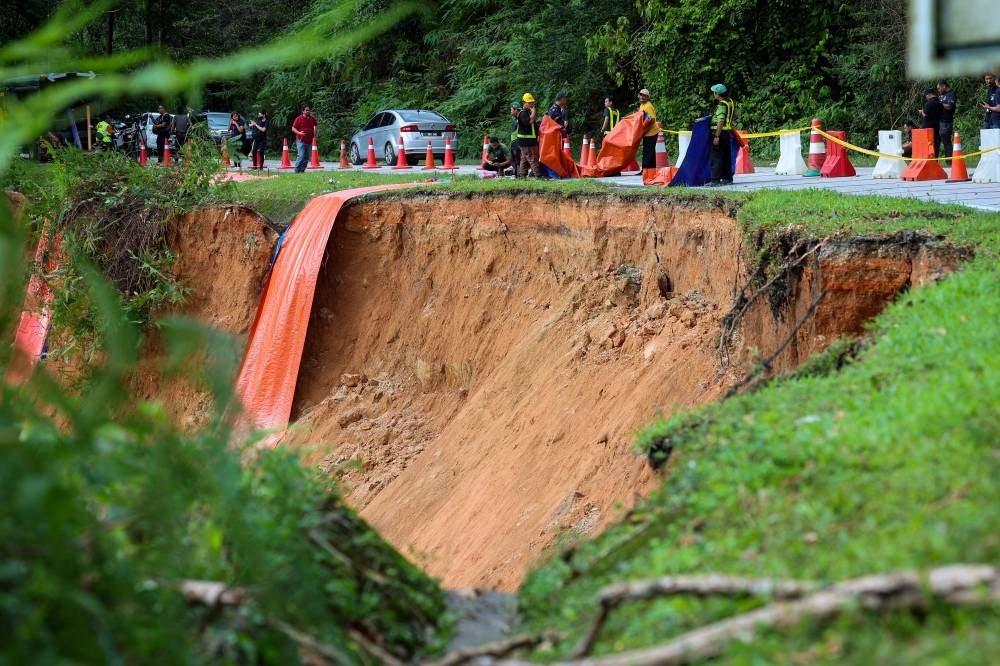Beef up protection of environmentally sensitive areas to prevent deadly landslides - experts
02 Feb 2023 10:31am

The Selangor government has completed the one-way road on Jalan Batang Kali-Genting Highlands, which was closed following the landslide at the Fathers' Organic Farm camp, Gohtong Jaya, which killed 24 victims on Dec 16 - BERNAMA
Some of the deadly landslides witnessed by the nation include the recent tragedy at Father’s Organic Farm in Batang Kali, Selangor, on Dec 16 which cost 31 lives and the Highland Towers disaster in Ulu Kelang here on Dec 11, 1993, that claimed 48 lives. On Dec 6, 2008, a landslide in Bukit Antarabangsa here destroyed 14 houses, killing four people and injuring 17.
The earliest fatal landslide recorded in Malaysia took place on Dec 17, 1919, at Bukit Tunggal in Ipoh, Perak, and 12 people perished in the incident that was caused by a falling block of limestone.
Experts warn that Malaysia will continue witnessing slope failures due to various factors, the main one being global climate change which is already causing unusually heavy rainfall in this country.
The Minerals and Geoscience Department was reported as saying that during the northeast monsoon period between November 2021 and March 2022, Malaysia recorded 23 cases of landslides. The department also detected 31 landslide hotspots last year.
Commenting on the Dec 16 Batang Kali tragedy, head of the Environment and Sustainability Cluster at the Academy of Professors Malaysia Prof Emeritus Datuk Dr Ibrahim Komoo was quoted as saying that it was caused by saturated soil due to continuous rain in the area. He said the saturated soil weakened the soil structure and caused the slope there to become unstable.
World Wide Fund for Nature (WWF)-Malaysia conservation director Dr Henry Chan said when an environmentally sensitive area (ESA) such as a slope is "disturbed” for development purposes, it can cause the soil there to become unstable.
He said any development in an ESA must be done in accordance with the ranking assigned to it by the authorities. ESAs are ranked in three categories: category one, no development, agriculture or logging shall be permitted; category two, no development or agriculture but sustainable logging and low-impact tourism may be permitted subject to local constraints; and category three, controlled development is allowed where the type and intensity shall be strictly controlled depending on the nature of the constraints.
Chan told Bernama it is crucial for highlands to be forested as the trees help to mitigate the effects of runoff water during the rainy season.
"Forests can retain excess rainwater, prevent excessive water flow and reduce damage from floods. They can also help to reduce the effects of droughts.
"Flash floods and landslides will occur if our forests are destroyed,” he said, adding that the government must strengthen the fourth National Physical Plan (NPP), notably with regard to ESAs, to ensure developments are carried out in a sustainable manner without resulting in loss of biodiversity.
Forestry expert and former director-general of the Forest Research Institute of Malaysia Tan Sri Dr Salleh Mohd Nor suggested that enforcement matters pertaining to land development be handed over to the state governments.
"We already have good laws and enactments to protect the environment but the implementation of the legislation and enforcement concerned must be handed over to the respective state government as they have absolute authority over land matters.
"Enforcement must be done fully at the state level for it to be effective,” he stressed.
According to Salleh, although Malaysia has stringent laws and regulations to control development activities in prohibited areas, the level of compliance, however, is still weak.
He also did not dismiss the possibility of corrupt elements having a hand in the occurrence of natural disasters such as landslides.
"To escape legal action, some people pay certain parties that are willing to accept (bribes)... when this happens, rules are violated and developments are carried out without adhering to the required standards.
"It’s not like they (developers) are not aware of the regulations. Everyone knows they want to take the easy way out to protect their own interests.
"We must put a stop to this culture of corruption, otherwise more protected areas will be exploited and natural disasters such as landslides and flash floods will continue to occur and cause deaths,” he said.
Planters International Bhd chairman Prof M Sadruddin, meanwhile, said any development plan involving forested hilly areas and slopes must be studied carefully before it is approved by the authorities.
He said landslides occur when slope management is not implemented properly and developments are not carried out in accordance with the approved plans.
"For example, there are developers who take shortcuts by proceeding with the construction without even waiting to get the green light (from the authorities) or carry out the development without following the schedule or chop down the trees without approval.
"Such acts can lead to slope failure... unplanned development can cause landslides, movement of groundwater and trees to fall, which can be life-threatening if there are settlements nearby,” he said.
M Sadruddin said any form of development, particularly in an ESA, should be audited by a third party to prevent irregularities or conflict of interest.
"The state government can appoint a private audit firm to carry out an audit in terms of the (project’s) planning, EIA (environmental impact assessment) report preparation and approval and also when the development is in progress by conducting site visits to ensure they comply with the established standards.
"Should there be any mishap due to a landslide, the authorities must take the necessary action,” he added - BERNAMA










